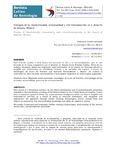Vestigios de la clandestinidad: sensorialidad y reterritorialización en el desierto de Sonora, México

View/
Use this link to cite
http://hdl.handle.net/2183/22590
Except where otherwise noted, this item's license is described as Atribución-CompartirIgual 3.0 España
Collections
Metadata
Show full item recordTitle
Vestigios de la clandestinidad: sensorialidad y reterritorialización en el desierto de Sonora, MéxicoAlternative Title(s)
Tracks of clandestinity: sensoriality and reterritorialización in the desert of Sonora, MexicoAuthor(s)
Date
2017Citation
Revista Latina de Sociología,2017,7(2):45-63.ISSN: 2253-6469
Abstract
[Resumen] Este artículo analiza a nivel teórico los procesos de des y re territorialización, que se dan durante en el cruce clandestino por el desierto de Sonora hacia Estados Unidos. Parto de un enfoque sensorial, donde los migrantes indocumentados, al no poseer un territorio efectivo y tangible por encontrarse en movilidad; conocen y se apropian del espacio a través de tecnologías de cruce de frontera que incluyen herramientas y objetos- en cuanto lo instrumental- pero también conocimientos y habilidades corporales en tanto capital migratorio [Abstract] This article is a theoretical analysis on the deterritorialization and reterritorialization processes involved in the clandestine crossing of the Sonora desert to the United States of America. I start from a sensorial approach where the undocumented immigrants while not have a tangible and instrumental territory as a result of being in constant movement, still recognize and appropriate the spatiality through border crossing technologies, which include tools and objects as materiality but also embodied knowledge and skills as migratory capital.
Keywords
Migración indocumentada
Tecnologías de cruce de frontera
Antropología de los sentidos
Sensorialidad
Procesos de territorialización
Undocumented migration
Border-crossing technologies
Anthropology of the senses
Sensoriality
Territorialization processes
Tecnologías de cruce de frontera
Antropología de los sentidos
Sensorialidad
Procesos de territorialización
Undocumented migration
Border-crossing technologies
Anthropology of the senses
Sensoriality
Territorialization processes
Editor version
Rights
Atribución-CompartirIgual 3.0 España
ISSN
2253-6469






